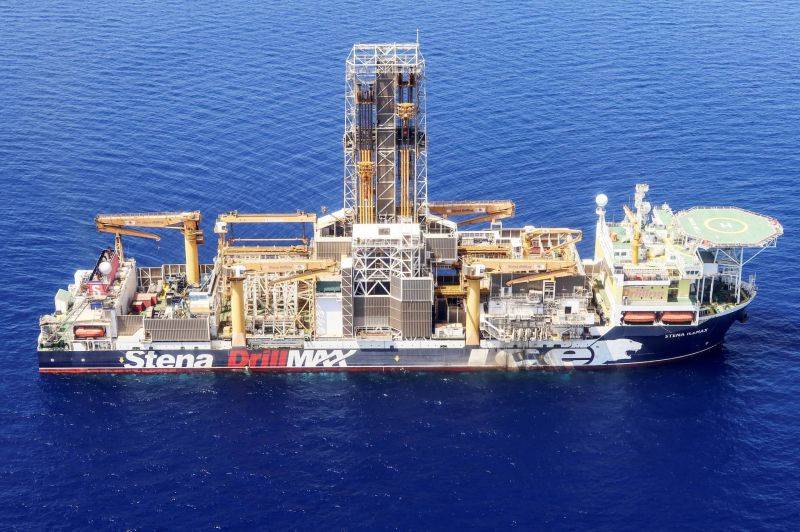
The Energean Power floating unit in the vicinity of the Karish field on May 9, 2022. (Credit: Ari Rabinovitch/Reuters)
This is the first time that the 13 so-called MPs of change agree on a sensitive issue, namely the maritime border demarcation.
When Energean's floating gas production rig docked in a disputed area between Israel and Lebanon, the newly elected protest movement MPs were quick to call for the need for Lebanon to officially claim Line 29, in a bid to prevent Israel from advancing in this zone and protect Lebanon’s rights — a position that indicates the presence of a counter-power within Parliament.
In this sense, the new MPs appear to be seeking to bring back a dynamic of accountability.
This position, however, sparked controversy on the local scene, with some accusing the MPs of playing into the hands of Hezbollah and stalling negotiations.
Officially, Lebanon claims Line 23 which grants it 860 square kilometers within the disputed area. But civilian and military experts are pushing for the country to claim an additional 1,430 square kilometers, delimited by Line 29.
Should Lebanon officially claim Line 29, a part of the Karish gas field the Energean Power wants to exploit would be considered to be within the disputed waters.
This is why the 13 protest movement MPs are calling upon the Lebanese authorities to amend Decree No. 6433 which allows Lebanon to officially claim Line 29.
“We want at least to assert and protect our rights legally and diplomatically,” Ibrahim Mneimneh, MP for Beirut, told L’Orient-Le Jour. He added that he was certain that Israel will not stop there.
During Tuesday’s parliamentary session for the election of the parliamentary committees’ members, MP Paula Yacoubian wanted to touch on the need to claim Line 29, an initiative that was cut short by Parliament Speaker Nabih Berri, who announced that the American mediator Amos Hochstein was expected soon in Beirut.
However, a US representative has said there are no official plans for Hochstein’s visit.
The day before, Berri said, “If Hochstein does not cooperate or does not obtain results, the Lebanese government must meet and decide unanimously to amend Decree No. 6433 and send it to the UN.”
This is a weapon Lebanon continues to brandish, believing that it can still slow Israel’s momentum.
It is in a bid to put an end to this confusion that the protest movement MPs are trying to drive the government and authorities into a corner.
A political cover for Hezbollah?
However, the timing of their move has drawn criticism, as changing positions during negotiations is not the best way to restore Lebanon’s credibility.
Moreover, formalizing the claim to Line 29 could derail the negotiations and cause the Americans to suspend their mediation efforts.
The Israelis withdrew from talks when Lebanon put its maximalist demands on the negotiating table.
“The MP’s role is not to endorse the most realistic decisions, even less to square with de facto situation, but to defend by all means the sovereign rights of the Lebanese people he represents,” said Laury Haytayan, an expert on the maritime border demarcation issue and spokesperson for the Taqqadom party to which two of the protest movement MPs, Marc Daou and Najat Aoun Saliba, belong.
The objective is to force Israel to return to the negotiating table by making the exploitation of the Karish field more problematic in terms of international law.
This is a strategy that does not speak to everyone, as it does not seem to take into account Hezbollah’s attitude, which has threatened to intervene against the floating rig if the Lebanese state considers it as a violation to its sovereignty.
The MPs could indeed give the impression that they are providing political cover for a possible action by the pro-Iranian party.
“It is the opposite. If we go through diplomacy and legal channels to assert our rights, it is the best way to avoid armed conflict and cut short any temptation to war mongering,” Yassin Yassin, MP for Bekaa II, told L’Orient-Le Jour.
Below legal rights
Siding with the protest movement MPs in their argument but without going so far as to openly call for officially claiming Line 29, Michel Moawad, the independent MP for Zgharta, denounced an endemic policy on the part of Lebanon to sell off the interests of the country for narrow political calculations and personal interests.
He recalled in this regard all the concessions and waivers made in all border issues including with Syria, where confusion reigns over land and maritime frontiers, not to mention the perennial problem of the Shebaa farms, “subject to all kinds of one-upmanship.”
“This is unheard of,” Moawad said. “The art of negotiation everywhere in the world is to claim your rights first and then decide what concessions to make in the talks. But Lebanon did the opposite. It started the talks with Israel by setting the bar below its legal rights,” Moawad added.
The protest movement MPs stance reverberated among the Lebanese diaspora, notably the Mouvement des Citoyens Libanais du Monde (MCLM).
“We are firmly opposed to any negotiation outside Line 29,” comments Elian Sarkis, member of the MCLM, told L’Orient-Le Jour, repeating the same arguments put forth by the Lebanese delegation of experts during negotiations in favor of this line.
The movement goes as far as to evoke “high treason” provided for by Article 277 of the Penal Code which heavily punishes “any Lebanese who, by acts, speeches, writings or others, will try to carve out a part of the Lebanese territory to annex it to a foreign country or to confer a right or privilege to the Lebanese State,” — another overbid with populist overtone sounding like wishful thinking in the lawless state that Lebanon has become.
This article was originally published in French with L'Orient-Le Jour. Translation by Sahar Ghoussoub.